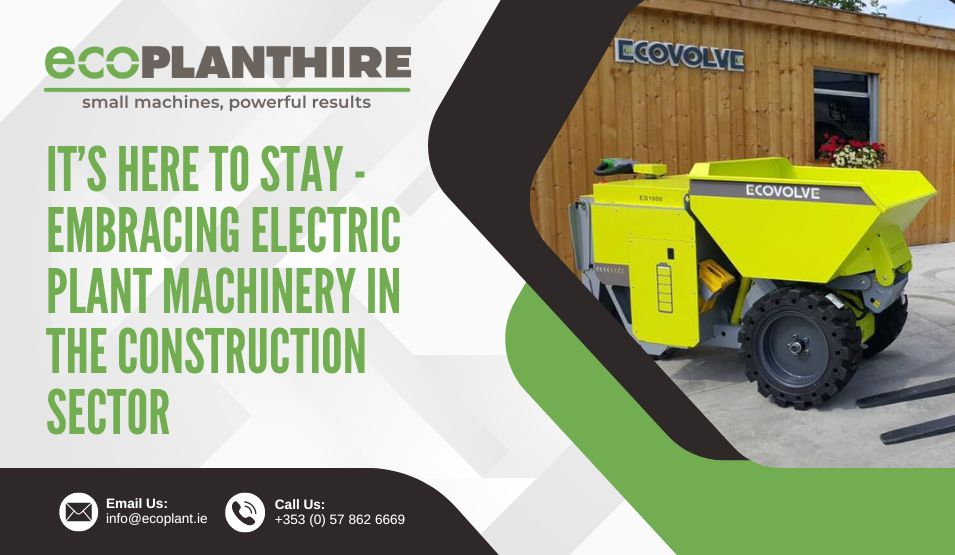The construction industry, historically reliant on fossil fuels, is undergoing a transformative shift towards sustainability.
Electric Vehicle (EV) technology, once confined to the automotive sector, is now making inroads into construction plant machinery. This article explores the rise of electric plant machinery in the construction sector, analyzing the interplay of regulatory frameworks, technological advancements, and the imperative for environmental stewardship.
Regulatory Landscape:
Global initiatives aimed at curbing emissions have spurred regulatory action, influencing the adoption of electric plant machinery. The Paris Agreement, signed by 196 nations, commits to limiting global warming to well below 2 degrees Celsius. Consequently, countries worldwide are enacting stringent emissions regulations, particularly targeting industries with significant carbon footprints, such as construction.
For instance, the European Union’s Emissions Trading System (ETS) imposes caps on greenhouse gas emissions, incentivizing the transition to cleaner technologies. Similarly, the United States Environmental Protection Agency (EPA) mandates emissions standards for non-road diesel engines, prompting manufacturers to explore alternative propulsion systems.
Health and Safety Considerations:
Beyond environmental concerns, the health and safety of workers are paramount. Diesel-powered machinery emits harmful pollutants, including nitrogen oxides (NOx) and particulate matter (PM), contributing to respiratory ailments and cardiovascular diseases among construction workers.
Electric plant machinery offers a compelling solution, with zero tailpipe emissions. By eliminating exhaust fumes, it creates safer working environments, reducing the risk of occupational health hazards. Moreover, the absence of engine noise mitigates noise pollution, fostering better communication and enhancing overall job site safety.
Technological Advancements:
Advancements in battery technology and powertrain efficiency have catalyzed the development of electric plant machinery. Lithium-ion batteries, with their high energy density and rapid charging capabilities, provide ample power for heavy-duty applications. Moreover, regenerative braking systems harness kinetic energy during deceleration, optimizing energy utilization and extending battery life.
Furthermore, electrification enables innovative features such as telematics and remote monitoring, enhancing equipment management and predictive maintenance. Real-time data analytics empower construction firms to optimize fleet utilization, minimize downtime, and streamline operations, driving cost efficiencies and enhancing productivity.
Reducing Fossil Fuel Dependency:
The construction industry’s dependence on fossil fuels not only contributes to environmental degradation but also exposes businesses to volatile fuel prices and supply chain disruptions. Electric plant machinery offers a reliable alternative, decoupling operations from fluctuating oil markets and geopolitical uncertainties.
By embracing electrification, construction firms can achieve long-term cost savings through reduced fuel consumption and maintenance expenses. Additionally, the inherent scalability of electric infrastructure facilitates the integration of renewable energy sources, such as solar and wind, further bolstering resilience and sustainability.
Conclusion:
The rise of electric construction machinery marks a pivotal moment in the evolution of the construction industry. Fueled by regulatory imperatives, health and safety considerations, technological innovations, and the pursuit of sustainability, this paradigm shift promises to redefine the sector’s future.
By embracing electric propulsion, construction firms can not only mitigate their environmental footprint but also enhance operational efficiency, worker well-being, and long-term competitiveness. As stakeholders navigate this transition, collaboration between policymakers, manufacturers, and industry players is essential to accelerate the adoption of electric plant machinery and pave the way for a greener, more sustainable built environment.
In summary, the case for adopting electric plant machinery in the construction sector is compelling, rooted in hard facts and driven by an imperative to build a better, more sustainable future.
Related Article in Irish Construction News: Ecoplant Hire leading the way in the green plant hire revolution

